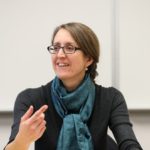In his 1994 Letter to Families, Pope John Paul II said that “the genealogy of the person is inscribed in the biology of generation” (section 9). This course probes the meaning of the pope’s assertion, beginning with a discussion of his understanding of the body as a primordial sacrament. The notion of person will be further elaborated in view of the Christian tradition with the aid of authors including Robert Spaemann. The work of philosophers of biology Hans Jonas and Stephen Talbott will illuminate the meaning of biology, considered both as the logic of life and as the study of living beings, and will offer a path for considering the relation between living beings as such and the particular kind of living being that a human person is. In view of the foregoing, the course will conclude with an examination of several accounts of the phenomenon of generation, from classical philosophy and contemporary biology. Taken together, these considerations aim at enriching both Christian anthropology and the discernment of the meaning and ethics of biotechnological interventions at the beginning of life.
Selected Texts
Fabrizio Amerini, Aquinas on the Beginning and End of Life.
Aristotle, Complete Works.
Angelo Scola, The Nuptial Mystery.
Hans Jonas, The Phenomenon of Life.
Robert Spaemann, Persons: The Difference between "Someone" and "Something".
John Paul II, Man and Woman He Created Them: A Theology of the Body.
Faculty

Lesley Rice
Assistant Professor of Bioethics
Dr. Rice received her doctorate in theology from the Pontifical John Paul II Institute with a dissertation on contemporary Catholic thought concerning biotechnology and the beginning of life. Her research concerns the history and philosophy of biology, the character of biological knowing, and the cultural and anthropological significance of biotechnologies.
Learn More